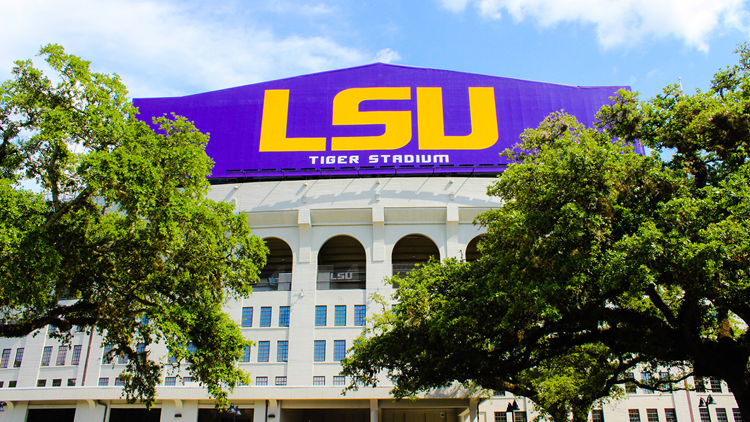BATON ROUGE, La. — LSU is ending its controversial, seven-figure agreement allowing Caesars Entertainment to advertise sports betting across the campus, according to officials at LSU and a sports marketing company involved in the deal.
The agreement, struck in 2021, was supposed to last several more years, said Lauren Capone of Playfly Sports, a marketing company that helped arrange the deal.
Capone said that talk of ending the deal began when a bill was filed in the Louisiana Legislature in March that would prohibit colleges and universities in the state from creating advertising agreements with gaming entities. The bill, by Sen. Gary Smith of Norco, passed the House on Tuesday.
Another factor was that the American Gaming Association, an industry group, updated its responsible marketing code in March to prohibit gaming companies from having partnerships with universities to promote sports betting.
Since then, several schools, including Michigan State and the University of Maryland, have said they were ending similar advertising agreements with gaming companies.
Smith said in a House committee meeting on May 16 that LSU, the only university in Louisiana with such a deal, was ending the arrangement with Caesars. Cody Worsham, LSU Athletics’ chief brand officer, confirmed Thursday that cancellation of the deal was being finalized.
Under the agreement, the first of its kind for an SEC school, Caesars Sportsbook was named the exclusive gaming and sportsbook partner of LSU Athletics.
Caesars received the rights to place signs throughout Tiger Stadium and to place its name on a new club seating arrangement in the south end zone. The area, called the Caesars Sportsbook Skyline Club, included seats for up to 1,500 fans, an all-you-can eat buffet and the option to purchase beer and wine.
The deal included Caesars Sportsbook signs in the venues for LSU’s 20 other men’s and women’s varsity sports programs, including the basketball and baseball arenas. Caesars also received an exclusive spot on LSU’s mobile sports app and other broadcasting and digital sponsorship rights.
In the following months, LSU promoted sports betting in mass emails sent to students, including those too young to legally gamble. These actions have brought criticism from students and professors. The opponents were concerned about high rates of addiction, underage gambling and students wasting money needed to pay off college.
LSU has been removing the Caesars Sportsbook signs, and Capone, the PlayFly Sports spokeswoman, said all of them should be removed by now.
Playfly Sports brings together athletic teams and partners to foster deals, creating new revenue streams for the teams. An LSU news release in 2021 described the company as LSU’s third-party multi-media rights holder.
LSU announced the deal in September 2021, two months before a law to legalize sports betting went into effect in Louisiana. LSU has been not disclosed how much money it was receiving from Caesars, saying only that it was “a multi-year, seven-figure deal.”
Michigan State University announced last week that its contract with Caesars also would be ending sooner than had been planned. This came after the faculty petitioned to end the agreement. Michigan State also works with Playfly Sports.
The University of Maryland said it has ended its agreements with PointsBet, an online sports betting company based in Denver, and the University of Colorado at Boulder has said its deal with that company is ending as well.
When LSU announced its agreement, Michael Schreiber, the chief executive of Playfly Sports said: “Given the explosive interest in and access to gaming, we are excited to responsibly bring Caesars Sportsbook and LSU together.”
The NCAA recently released survey data that indicates 67% of on-campus students participate in sports betting and 58% of all surveyed students had betted at least once. The students in the survey were aged 18-22.
In Louisiana, the legal age for sports betting and any other form of gambling is 21.
The NCAA survey also found that 58% of on-campus students who saw ads for sports betting companies were more likely to place bets after seeing the ads.
Robert Mann, a professor of mass communications at LSU, was one of the most vocal critics of LSU’s deal with Caesars. He tweeted earlier this year: “Still sickened by how quickly the people who run LSU were to embrace sports betting, heedless of the potential damage to students and athletes.”
Mann said in an interview Friday that he was glad to see the deal ending.
“I mean, I think they’re being forced to do the right thing,” he said, referring to LSU Athletics. “Not of their own accord but because of external circumstances and people who exercise better judgment than they did.”
► Get breaking news from your neighborhood delivered directly to you by downloading the new FREE WWL-TV News app now in the IOS App Store or Google Play.



